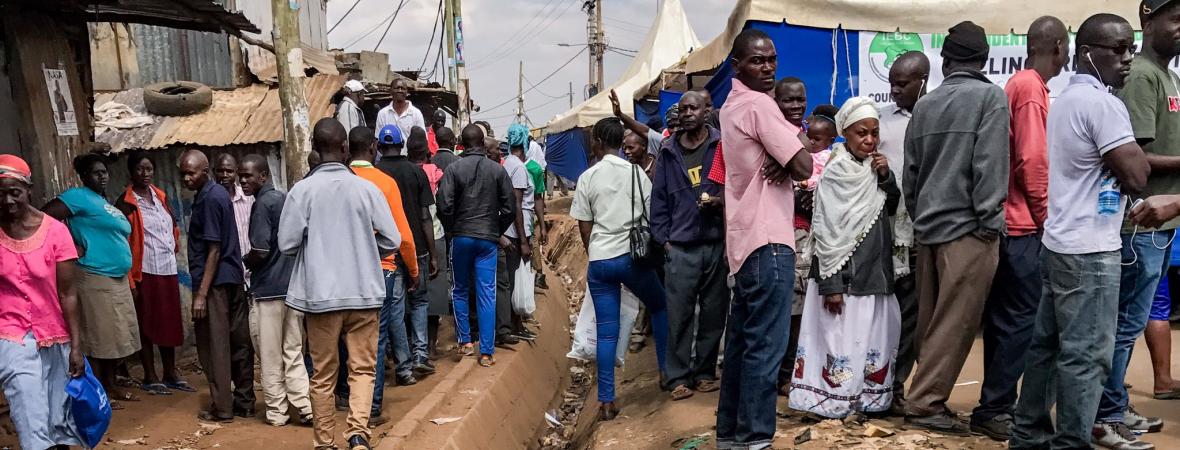A Recap of Kenya Elections 2017: Barriers and Opportunities to Participation

On August 15, just one week after the highly anticipated Kenyan general elections (check out IRI’s podcast on Kenya), the International Republican Institute hosted an expert panel of academics and development practitioners to analyze the conduct of the elections, its outcome and what it means for the future of the country.
Kate Almquist Knopf of the Africa Center for Strategic Studies moderated the event, and expert panelists included IRI’s own Africa Director John Tomaszewski, Gabrielle Bardall from Inclusive Political Processes, Adrienne Lebas from American University and Jonas Claes of the U.S. Institute of Peace (USIP).
While each panelist focused on specific areas of interest, the general theme of the discussion included analysis of outcomes from key races, women and youth participation, the impact of devolution on the elections and issues related to electoral violence before, during and after elections. The panelists also discussed the high turnover of incumbents in this election, which signaled Kenyans’ continued willingness to change leaders in parliament and other bodies at a much higher rate than other countries in the region. Twenty-four governors, including the sitting and former chairs of the powerful Council of Governors, lost their seats, as did many members of Parliament and county assemblies. The panel attributed this anti-incumbent bias to Kenyans’ high expectations and disappointment in specific areas like service delivery, corruption and resource management.
Tomaszewski pointed out that incumbent President Uhuru Kenyatta’s Jubilee Party won nearly all of the governor and Senate seats in North Eastern Kenya, which was a major blow to opposition candidate and former Prime Minister Raila Odinga’s opposition National Super Alliance (NASA). Despite increased competition due to the growth of candidates from the 2013 elections, Jubilee prevailed and will now have the majority of governorships and a working majority in Kenya’s Parliament. Also notable were some of the key successes from youth and women candidates. This election saw the first women elected as governors and to the Senate. Kenya’s youngest lawmaker, 23-year old John Paul Mwirigi, defeated a senior politician from the ruling Jubilee Party—winning a National Assembly seat through an insurgent grassroots campaign conducted on his bicycle.
Reflecting on the notable gains for women in this election, Bardall suggested that people should view these results through a sober lens. She noted that despite women winning in the Senate and governorships for the first time, Kenya’s government has yet to implement a significant constitutional provision that calls for not more than two-thirds of either gender to occupy a representative body like Parliament. She further argued that this “two-thirds gender principle” in the 2010 Constitution of Kenya hurts women more than it helps them since it creates an uneven playing field. Nonetheless, Kenya’s failure to implement the gender principle could render the next Parliament unconstitutional should the people of Kenya seek to challenge its composition in court. Bottom line, Kenya’s struggle for gender equality continues.
Discussed at length by both Tomaszewski and Lebass was the role of devolution in increasing the competition of the 2017 general elections. The aggressive form of decentralized government has changed the way Kenyans think about elected sub-national government positions—from governors and ward representatives to the county assembly. Tomaszewski pointed out that many senior members of parliament ran for the newly-created Senate in the last general elections thinking that this new second chamber in Parliament would play a significant role. But in this election, many of those senior politicians abandoned the Senate to seek governorships in their local counties after seeing the resources and political power the governor wields in their communities. Lebas outlined two possible scenarios for Kenya under the current devolved system of government. First, Kenya will continue to develop and prosper, creating a more accountable form of government by establishing stronger local governments and weakened alliance politics, or subnational ethnic grievances become exacerbated, and Kenya will see an increase in overpaid, untouchable political officers. Regardless of the outcome, devolution has changed Kenya’s electoral politics.
The anticipation surrounding this election was partially driven by the unpredictable threat of violence before, during and after the election. Between the increased competition – roughly 16,000 candidates competing for about 1,882 elective positions – and the heightened political and ethnic polarization in the country since the last general election in 2013, there was concern that Kenya may have a repeat of the violence it witnessed in the 2007 election.
USIP’s Claes said that when viewing electoral violence it is necessary to observe a full electoral cycle and not just the weeks before and after Election Day. Understanding the larger context will help determine more definitively whether or not Kenya’s 2017 general elections were peaceful or violent. This determination may become more apparent in the coming weeks as the country’s Supreme Court is due to deliver a ruling on the petition filed by leading opposition presidential candidate, Raila Odinga, alleging that the election was rigged to favor President Kenyatta.
Finally, the panelists discussed how the 2017 general elections will impact Kenya’s long term democratic development. Those who side with Raila Odinga do feel aggrieved and have expressed disillusionment on how the electoral commission, conducted the announcing of election results, particularly for the presidency. Moreover, several candidates were allowed to contest and win, despite having questionable ethical records and even criminal investigations on corruption hanging over their heads. These issues have certainly bred a lack in confidence among voters, particularly younger ones, and could result in increased voter apathy in future elections.
Reported violence against women, both as candidates and as voters, could impact future elections and the participation of women in Kenya’s political processes. Several questions also remain as to how or if the political and ethnic divides in the country can be healed following a bruising general election. As such, each panelist nodded in solemn yet earnest agreement when Tomaszewski said, “IRI hopes Kenyatta will bring the country together.”
Top